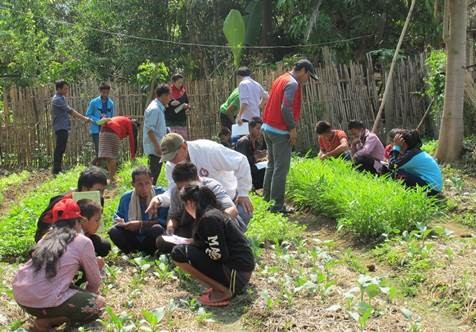Developing farmer field school capacity in Laos under an IFAD-FAO Initiative

FAO worked closely with the Ministry of Agriculture and Forestry in Laos, local agricultural authorities and the International Fund for Agricultural Development (IFAD) to develop the capacity of a core group of trainers to establish farmer field schools in the country. The two-year initiative was part of the IFAD-funded "Community-Based Food Security and Economic Opportunities" project – also known as “Soum Son Seun Jai” (SSSJ).
Farmer field schools, developed by FAO, are ‘schools without walls’, where farmers come together to learn through field observation and experimentation – a ‘learning-by-doing’ approach. They also discuss and debate relevant issues and share experiences. This approach improves farmers’ access to information and new methods and technologies, and also helps them optimize productivity for better food and nutrition security.
Although FAO’s farmer field schools have been around since 1989, the approach was new to the project’s implementing agency in Laos, said Rik Delnoye, an international technical advisor for the SSSJ project. “Initiating farmer field schools as a leading extension and learning approach within the SSSJ project has been challenging as there was zero prior in-house knowledge or experience with this approach within the implementing agency,” he said. But he added that thanks to the partnership with FAO, “we have come far and can safely say that we have almost 70 well trained facilitators and numerous farmer field schools being initiated.”
Rolling out the schools
The next step is to scale up the schools by putting these trained facilitators to work. This will involve rolling out farmer field schools over the next 18 months in 225 target villages in the provinces of Sayabouly and Oudomxay, where the project is active.
“The challenge will be to arrange for a smooth flow of support, including financial support to the facilitators, enabling them to initiate and facilitate farmer field schools in two to three villages each,” Delnoye said. “We foresee that they will require additional coaching from external sources as well as probably a refresher training somewhere in the coming year.”
Although the capacity development initiative has finished, IFAD and the project team have requested FAO’s continued support. Moving the farmer field school work forward in Laos will require addressing a number of challenges, said Jan Willem Ketelaar, team leader and expert with the Intercountry Programme for Integrated Pest Management in Vegetables in FAO’s Regional Office for Asia and the Pacific, which collaborated with the FAO Investment Centre and FAO Laos country office on the initiative.
For one, sufficient and timely budget support will need to be allocated as well as enough time for the training of trainers and for farmer field schools to grow a good selection of vegetables from seed to harvest. SSSJ project staff will need to receive monitoring and coaching support to ensure more successful farmer field schools. And it will be important to motivate and make good use of experienced farmer field school trainers already familiar with the curriculum content and facilitation skills.
Increased interest and collaboration
These efforts have generated positive momentum in Laos. They have helped increase stakeholders’ interest in the farmer field school approach and strengthen implementation at field level. And the innovative farmer field school curriculum and learning modules for food security and nutrition activities can be used in other FAO-supported farmer field school interventions in the country. They have also assisted in consolidating collaboration between IFAD and FAO at country level – for this and other initiatives.
For more information on Farmer Field Schools, please see the following:
Guidance Document: Planning for Quality Programmes (2016)
Implementation Guide (2011)
Photo credit: IFAD/FAO SSSJ team.
